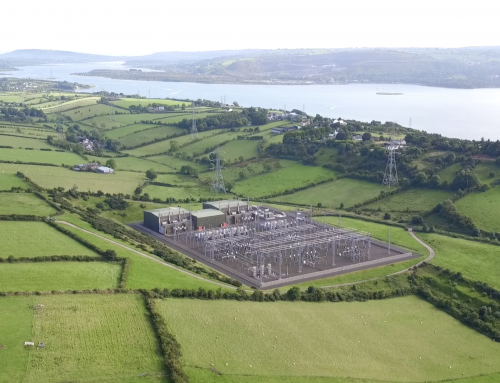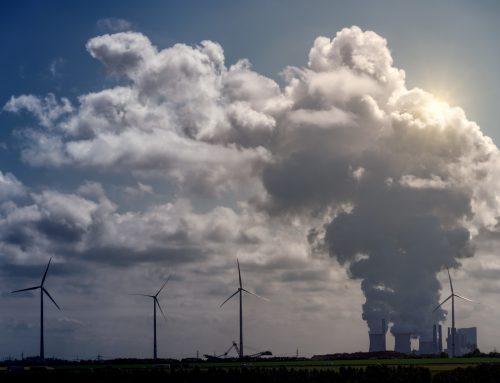- Consortium awarded funding to explore ‘Green Shipping Corridor’ between Northern Ireland and Northwest of England
- Project will assess green methanol synthesised at port of Larne to power a freight ferry that demonstrates a circular CO2 economy and ‘true zero’ emissions
New technology can unlock green methanol as a scalable zero emission fuel for the global maritime sector, according to a local consortium. Larne-based B9 Energy Storage and Teesside University’s Net Zero Industry Innovation Centre have developed an innovative, patent pending tech solution, which has the potential to make a truly net zero green methanol economy a reality.
Together with fellow partners DFDS Seaways, DFDS Logistics, JG Maritime Solutions, Larne Harbour and Mutual Energy, the project has been successful in securing funding as part of the Clean Maritime Demonstration Competition Round 4 (CMDC4), funded by the UK Department for Transport (DfT) and delivered by Innovate UK. CMDC4 is part of the Department’s UK Shipping Office for Reducing Emissions (UK SHORE) programme, a £206m initiative focused on developing the technology necessary to decarbonise the UK domestic maritime sector.
The project will investigate the feasibility of establishing an ‘NI/GB Green Shipping Corridor’ between Northern Ireland and the Northwest of England using a roll on / roll off (ro-ro) freight ferry, powered by hydrogen reformed onboard from green methanol delivered in road mobile ISO tank containers. The green methanol would be synthesised in the Port of Larne from green hydrogen and carbon dioxide as part of the Ballylumford Power-to-X Project.
The project includes the feasibility of capturing CO2 from an onboard reformer and returning it to the methanol synthesis plant in the same tank containers that delivered the methanol, thereby setting up a circular CO2 economy that avoids future supply constraint of green CO2. The port-based flexible green methanol plant will use otherwise curtailed wind power to drive a 150MWe electrolyser that feeds green hydrogen through a pipeline to a catalytic reactor.
The Domestic Green Shipping Corridor would have ‘true-zero’ emissions, would not be reliant upon limited supplies of bio-derived CO2 or direct air-captured CO2 and would not need any carbon offsetting to meet net zero objectives.
The performance of the new technology will first be simulated using techno-economic modelling of the Green Shipping Corridor, which includes details of the latest ro-ro freight ferry design from partner DFDS Seaways, Europe’s largest ro-ro freight ferry operator, and then followed up by pre-deployment trials at the Port of Larne, also a project partner.
David Surplus OBE, Managing Director of B9 Energy Storage, and co-inventor of the innovative system, said: “We are very pleased to be working closely with consortium members to bring the green methanol economy to reality. Green methanol is a preferable zero-emission fuel for the shipping industry, and through our work on this project we want to demonstrate how this technology can be scaled up and delivered.”
Dr. Kumar Patchigolla, Professor of Decarbonisation of Industrial Clusters at NZIIC, said: “The Net Zero Industry Innovation Centre (NZIIC) at Teesside University will examine the positive role that methanol is playing in decarbonising the marine sector in support of global net zero ambitions and the green economy. Methanol is an untapped fuel with the potential to transform the maritime sector into a green industry.”
John Garner, Managing Director of JG Maritime Solutions Limited, said: “Our team are very pleased to be a partner in this UK Domestic green shipping corridor feasibility study and pre-deployment trials. Our role is to develop a clear plan on how the corridor will comply with the relevant regulations including all safety rules. We are excited to research how the use of emerging alternative fuels such as methanol, fuel cells and carbon capture systems can be brought together in a zero-emission ship and net zero emissions in ports. We look forward to working with our partners, collaborating with ship and shore regulators as well as industry stakeholders to deliver a successful outcome to this important decarbonisation project.”
Paddy Larkin, Chief Executive of Mutual Energy, said: “We pride ourselves on the safe management and delivery of critical energy infrastructure and look forward to bringing our expertise to design the pipeline to transport hydrogen from the electrolyser to the methanol production site. With support from InnovateUK and in collaboration with partners, we hope to advance the hydrogen economy and energy transition for Northern Ireland through this project which showcases the potential demand for hydrogen. Hydrogen is an incredibly versatile and clean energy carrier with applications across sectors and this project is another example of the crucial role it can play in the decarbonisation of the Northern Ireland economy.”
Mads Bentzen, DFDS Seaways and Andrew Mawhinney, DFDS Logistics added: “DFDS is actively engaged in projects with alternative fuels to be able to deliver on its decarbonisation objectives. This project offers an opportunity to explore green methanol for vessels and hydrogen for road and land applications. We are pleased to be a partner in this feasibility study.”




